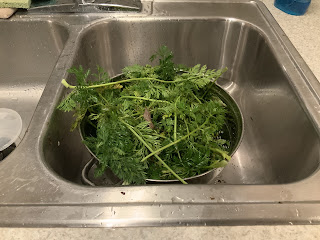In a February post, I talked about frilusliv,
the Norwegian concept of “open air living.” I’m all for it—if I’m bundled up,
that is.
Today, it wasn’t raining, about 37 degrees, and I had a bunch of chores
to do before I ran out of light. So I packed on my layers—long johns, two wool
vests over a shirt plus a couple of sweatshirts on top, Carhartt pants and the
ancient ski jacket I’ve had since 1989. I pulled on my muck boots and a pair of
thermal mittens and I was set.
I imagine any of you living in much colder climates are thinking LOL: she
thinks 37 degrees is cold! But in my own defense, when I’m working in the
garden, my hands get terribly cold—I get chilblains at the drop of a hat—though
the rest of me will be fine.
Anyway, I chopped a little firewood to warm up, then tackled the
chicken coop. After feeding the hens, I had a pile of fall leaves I’d been
saving for mulch to haul out of the carport. Because, gee, we might want to
park our car in there.
Next, I needed to add leaves to my compost pile—with all the rain we’ve
had, the pile is beyond sodden. But on the plus side, turning all that heavy
material is a way to stay strong.
After I’d finished these chores, dusk was falling. Yet, one more
important task beckoned: I was 2 months overdue on harvesting my fall carrot
crop. There had been numerous frosts, so I knew the carrots would be super-sweet.
But with the holidays coming, I wouldn’t have much time for gardening. And
leaving my crop in the soil through more rain and frost cycles, I was risking
the roots starting to decompose.
My mittens were still dry. Although the temp had probably dropped to 34
degrees by now, I figured even in the fading light, I could get a few carrots
out of the ground. So squinting at the bed, I pulled as many out as I could and
stuffed them into the little plastic strainer-type tote I use for harvesting.
Then as darkness fell, I hosed the carrots down as best I could and took the
sopping little tote into the house.
But I managed to get the roots thoroughly washed and the tops cut off. Tomorrow, I’ll toss the tops back onto the carrot bed—they’ll make good winter mulch.
As I cleaned up the kitchen, this harvest felt like a big win—and now
we’ll have enough carrots well into winter.
Here in the Foothills, spinach leaves don’t really grow in the winter
months; the best you can hope for is that the plant will just stay alive and
not get devoured by slugs. Then, in the longer daylight of early April, the
plants generally have a big growth spurt and will be ready for picking in a few
weeks!
I got my garlic in just after Thanksgiving—a bit later than I wanted.
Now it’s covered with layers of chopped leaves, with compost on top for nutrition
and to weigh down the mulch.
I have yet to take on finishing my parsnip harvest—I still have about
2/3 of the bed to pick. Unlike carrots, which you can generally pull right out
of the soil, the tops of the parsnip roots are at least an inch below the soil
surface, and the roots get really lodged into the soil.
Another challenge is that by December, the foliage by now has died back
considerably. As a result, a little tug will detach the tops from the roots.
You need a hand fork at best, and this week, with the soil so heavy, you have
to use a spading fork to loosen the dirt surrounding the root enough to pull on
it.
The parsnips will actually overwinter fairly well, at least into late January or early February. So when it’s a bit warmer, and I’ve got lots of time and am primed to
get really wet and dirty, I’ll take ‘em on!


No comments:
Post a Comment